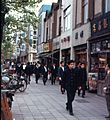Fushūgaku facts for kids
Fushūgaku (Japanese: 不就学) is a special word used in Japan. It means "not attending school." This term is mostly used when talking about children from Brazil who live in Japan. These children are often called Brazilian Japanese.
Contents
Why Some Kids Don't Go to School
There are several reasons why some children in Japan might not be able to attend school. It's a complex issue with different challenges for families.
Language Challenges
One big reason is that some children cannot understand Japanese. If a child moves to Japan from another country, or if their family speaks a different language at home, learning Japanese can be very hard. Schools teach in Japanese, so if a child doesn't know the language well, it's difficult for them to follow lessons and learn. This can make school feel overwhelming and frustrating.
Financial Difficulties
Another reason is that some parents might find it hard to pay for school. While public elementary and junior high schools in Japan don't charge tuition fees, there can still be other costs. These might include money for school lunches, uniforms, textbooks, or special activities. For families who are struggling financially, even these extra costs can be a big burden, making it tough to send their children to school regularly.
Cultural Differences
Sometimes, cultural differences can also play a role. Children from different backgrounds might find it hard to adjust to the Japanese school system, which has its own unique rules and ways of doing things. This can be especially true for children who have grown up in a different culture.
Related topics
Images for kids


